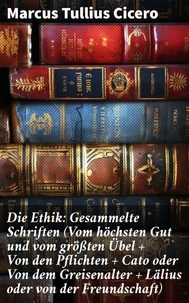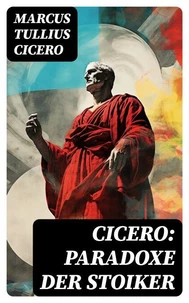Against Verres
Par : ,Formats :
Disponible dans votre compte client Decitre ou Furet du Nord dès validation de votre commande. Le format ePub est :
- Compatible avec une lecture sur My Vivlio (smartphone, tablette, ordinateur)
- Compatible avec une lecture sur liseuses Vivlio
- Pour les liseuses autres que Vivlio, vous devez utiliser le logiciel Adobe Digital Edition. Non compatible avec la lecture sur les liseuses Kindle, Remarkable et Sony
 , qui est-ce ?
, qui est-ce ?Notre partenaire de plateforme de lecture numérique où vous retrouverez l'ensemble de vos ebooks gratuitement
Pour en savoir plus sur nos ebooks, consultez notre aide en ligne ici
- Nombre de pages434
- FormatePub
- ISBN859-65--4772660-9
- EAN8596547726609
- Date de parution19/11/2023
- Protection num.Digital Watermarking
- Taille732 Ko
- Infos supplémentairesepub
- ÉditeurDIGICAT
Résumé
In "Against Verres, " Marcus Tullius Cicero delivers a masterful set of speeches that embody the principles of Roman rhetoric while deftly critiquing the corrupt provincial governor, Gaius Verres. Written in 70 BCE, this work is a pivotal example of Roman oratory, highlighting Cicero's skillful use of pathos, ethos, and logos to sway public opinion. Cicero meticulously chronicles the abuses of power Verres inflicted upon the citizens of Sicily, vividly illustrating themes of justice, corruption, and civic duty.
Through eloquent prose and engaging narrative, he calls upon the Roman Senate to hold Verres accountable, effectively showcasing the intersection of law and morality in Roman society. Marcus Tullius Cicero, a philosopher, statesman, and lawyer, was profoundly influenced by the turbulent political climate of his time. Living amidst the decline of the Roman Republic and grappling with moral integrity, Cicero's experiences compelled him to advocate for justice and uphold the rule of law.
His position as a consul and his participation in the political forum equipped him with a robust understanding of rhetoric and ethics, shaping his passionate defense against Verres. "Against Verres" is essential reading for anyone interested in Roman history, legal philosophy, and the art of persuasion. Cicero's ageless exploration of moral outrage and civic responsibility continues to resonate, making it a vital text for scholars and casual readers alike.
Engage with this dramatic trial and witness the rhetorical brilliance that secured Cicero's legacy as one of history's foremost orators.
Through eloquent prose and engaging narrative, he calls upon the Roman Senate to hold Verres accountable, effectively showcasing the intersection of law and morality in Roman society. Marcus Tullius Cicero, a philosopher, statesman, and lawyer, was profoundly influenced by the turbulent political climate of his time. Living amidst the decline of the Roman Republic and grappling with moral integrity, Cicero's experiences compelled him to advocate for justice and uphold the rule of law.
His position as a consul and his participation in the political forum equipped him with a robust understanding of rhetoric and ethics, shaping his passionate defense against Verres. "Against Verres" is essential reading for anyone interested in Roman history, legal philosophy, and the art of persuasion. Cicero's ageless exploration of moral outrage and civic responsibility continues to resonate, making it a vital text for scholars and casual readers alike.
Engage with this dramatic trial and witness the rhetorical brilliance that secured Cicero's legacy as one of history's foremost orators.
In "Against Verres, " Marcus Tullius Cicero delivers a masterful set of speeches that embody the principles of Roman rhetoric while deftly critiquing the corrupt provincial governor, Gaius Verres. Written in 70 BCE, this work is a pivotal example of Roman oratory, highlighting Cicero's skillful use of pathos, ethos, and logos to sway public opinion. Cicero meticulously chronicles the abuses of power Verres inflicted upon the citizens of Sicily, vividly illustrating themes of justice, corruption, and civic duty.
Through eloquent prose and engaging narrative, he calls upon the Roman Senate to hold Verres accountable, effectively showcasing the intersection of law and morality in Roman society. Marcus Tullius Cicero, a philosopher, statesman, and lawyer, was profoundly influenced by the turbulent political climate of his time. Living amidst the decline of the Roman Republic and grappling with moral integrity, Cicero's experiences compelled him to advocate for justice and uphold the rule of law.
His position as a consul and his participation in the political forum equipped him with a robust understanding of rhetoric and ethics, shaping his passionate defense against Verres. "Against Verres" is essential reading for anyone interested in Roman history, legal philosophy, and the art of persuasion. Cicero's ageless exploration of moral outrage and civic responsibility continues to resonate, making it a vital text for scholars and casual readers alike.
Engage with this dramatic trial and witness the rhetorical brilliance that secured Cicero's legacy as one of history's foremost orators.
Through eloquent prose and engaging narrative, he calls upon the Roman Senate to hold Verres accountable, effectively showcasing the intersection of law and morality in Roman society. Marcus Tullius Cicero, a philosopher, statesman, and lawyer, was profoundly influenced by the turbulent political climate of his time. Living amidst the decline of the Roman Republic and grappling with moral integrity, Cicero's experiences compelled him to advocate for justice and uphold the rule of law.
His position as a consul and his participation in the political forum equipped him with a robust understanding of rhetoric and ethics, shaping his passionate defense against Verres. "Against Verres" is essential reading for anyone interested in Roman history, legal philosophy, and the art of persuasion. Cicero's ageless exploration of moral outrage and civic responsibility continues to resonate, making it a vital text for scholars and casual readers alike.
Engage with this dramatic trial and witness the rhetorical brilliance that secured Cicero's legacy as one of history's foremost orators.






